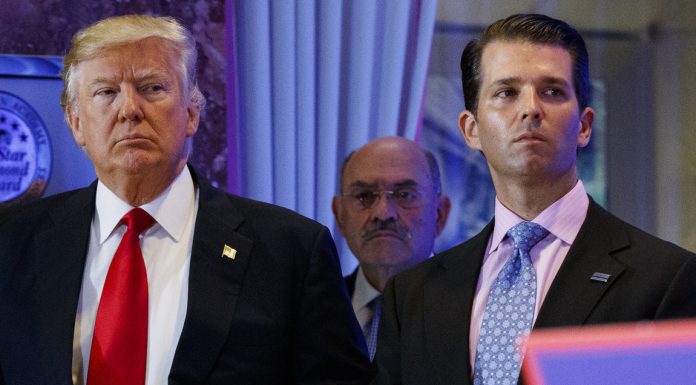(Headline USA) The Trump Organization and its longtime finance chief each pleaded not guilty Thursday to tax avoidance charges arising from a two-year investigation into former president Donald Trump‘s company.
It is the first criminal case — a flimsy one — that New York authorities’ fishing expedition has yielded. According to the indictment filed Wednesday and unveiled Thursday, from 2005 through this year Weisselberg and the company “cheated” the state and city out of taxes by conspiring to pay senior executives off the books.
Prosecutor Carey Dunne described a 15-year scheme “orchestrated by the most senior executives,” including CFO Allen Weisselberg, that was “sweeping and audacious.”
Trump himself was not charged, jointly pursued by New York County District Attorney Cyrus Vance Jr. and New York Attorney General Letitia James, both Democrats, and Dunne laughably asserted politics played no role in the decision to bring charges.
“Politics has no role in the jury chamber and I can assure you it had no role here,” Dunne said.
Meanwhile, legal observers had a hard time remembering whether any similar transgressions had ever been prosecuted criminally. From RedState:
From a layman’s perspective, this is absolutely pathetic stuff. They investigated the Trump organization for three years and the best they could come up with is unpaid taxes on fringe benefits? This is the kind of thing you normally handle as a civil matter. In fact…the Times literally could not find a previous example of a prosecutor filing criminal charges in a similar case. That’s how much of a politicized witch-hunt this entire thing is.
These marginal charges come days after it was leaked that Trump himself would not be charged for anything, and you know that wasn’t from lack of trying. Per RedState’s report on that, there isn’t some other shoe waiting to drop either. This is literally all there is.
Even an MSNBC legal analyst, Danny Cevallos, said, “Not sure any taxable-fringe-benefit cases brought in federal court last year. Doesn’t become a criminal case very often.”
Weisselberg’s lawyers, Mary Mulligan and Bryan Skarlatos, said in a statement before his appearance that the executive would “fight these charges in court.” Skarlatos later said Dunne’s remarks were misleading in regard to his client.
A lieutenant to generations of Trumps, Weisselberg has intimate knowledge of the former president’s business dealings and the case could give prosecutors the means to pressure him into cooperating with an ongoing probe into other aspects of the company’s business.
So far, though, there’s no sign that the man regarded by Trump’s daughter Ivanka as a “fiercely loyal” deputy who’s “stood alongside my father and our family” for decades will suddenly turn on them.
In a statement Thursday, the Trump Organization defended Weisselberg, saying the 48-year employee was being used by Vance’s office as “a pawn in a scorched-earth attempt to harm the former president.”
“This is not justice; this is politics,” the Trump Organization said, arguing that neither the IRS nor any other district attorney would ever think of bringing such charges over employee benefits.
Earlier in the week, Trump blasted New York prosecutors as “rude, nasty, and totally biased” and said his company’s actions were “standard practice throughout the U.S. business community, and in no way a crime.”
In court, Trump Organization lawyer Alan Futerfas said Dunne’s remarks sounded like a “press release,” but didn’t comment further.
Vance, who leaves office at the end of the year, has been conducting a wide-ranging investigation into a variety of matters involving Trump and the Trump Organization, such as hush-money payments paid to women on Trump’s behalf and truthfulness in property valuations and tax assessments, among other matters.
Vance fought a long battle to get Trump’s tax records and has been subpoenaing documents and interviewing company executives and other Trump insiders.
James assigned two lawyers from her office to work with Vance’s team on the criminal probe while continuing her own civil investigation.
Weisselberg, an intensely private man who lived for years in a modest home on Long Island, came under scrutiny of Vance’s investigators, in part, because of questions about his son’s use of a Trump apartment at little or no cost.
Barry Weisselberg, who managed a Trump-operated ice rink in Central Park, testified in a 2018 divorce deposition that the Trump Parc East apartment was a “corporate apartment, so we didn’t have rent.”
Barry’s ex-wife, Jen Weisselberg, has been cooperating with both inquiries and given investigators reams of tax records and other documents. In March, she told The New Yorker that some compensation for Trump Organization executives came in the form of apartments and other items and that “only a small part of your salary is reported.”
The Trump Organization is the business entity through which the former president manages his many entrepreneurial affairs, including his investments in office towers, hotels and golf courses, his many marketing deals and his television pursuits. Trump’s sons Donald Jr. and Eric have been in charge of the company’s day-to-day operations since he became president.
James Repetti, a tax lawyer and professor at Boston College Law School, said a company like the Trump Organization would generally have a responsibility to withhold taxes not just on salary, but other forms of compensation — like the use of an apartment or automobile.
Such perks wouldn’t be considered taxable income if they were required as a condition of employment, Repetti said, such as providing an apartment for the convenience of an employee who is required to be at the office or worksite at odd or frequent hours, or allowing the use of a car for business purposes.
The Trump Organization case involves possible violations of New York state tax laws.
“The IRS routinely looks for abuse of fringe benefits when auditing closely held businesses,” Repetti said. “The temptation for the business is that it claims a tax deduction for the expense, while the recipient does not report it in income.”
Adapted from reporting by Associated Press.

